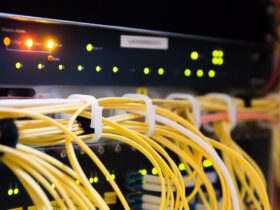With the rise of computer and information technology, cybersecurity has become a critical concern for individuals and organizations alike. In today’s world, almost everything is connected to the internet, and with that comes a host of potential cybersecurity threats. In this article, we will discuss the importance of cybersecurity and why it’s essential to protect yourself and your business from these threats.
What is Cybersecurity?
Cybersecurity is the practice of protecting computer systems, networks, and electronic devices from unauthorized access, theft, damage, and other malicious activities. Cybersecurity encompasses a range of technologies, processes, and practices designed to prevent, detect, and respond to cyber threats.
Cyber threats come in many forms, including viruses, malware, phishing attacks, ransomware, and more. Cyber attackers can target anyone, from individuals to large corporations and government agencies. The goal of cybersecurity is to protect against these threats and minimize the risks of cyber attacks.
.
Why is Cybersecurity Important?
Cybersecurity is essential for several reasons. First, it helps protect personal information, such as financial information, social security numbers, and medical records, from being stolen or misused. Cybersecurity also safeguards intellectual property, trade secrets, and other valuable information that can be stolen and used for competitive advantage or financial gain.
Second, cybersecurity is critical to protecting businesses and organizations from cyber attacks. Cyber attacks can cause financial losses, reputational damage, and legal liabilities. They can also disrupt business operations, compromise sensitive data, and harm customer trust.
Finally, cybersecurity is vital to safeguarding critical infrastructure, such as power grids, transportation systems, and water supplies. These systems are interconnected and rely on technology, making them vulnerable to cyber attacks. A successful cyber attack on critical infrastructure could have devastating consequences, including loss of life and significant economic damage.
The Importance of Cybersecurity

Cybersecurity is essential for several reasons. Here are some of the most significant reasons why it’s crucial to prioritize cybersecurity:
1. Protecting Sensitive Information
In today’s digital world, data is an incredibly valuable commodity. Cybercriminals can steal sensitive information like credit card numbers, bank account details, and personal identification information. If left unprotected, this information can be used to commit identity theft or financial fraud. By implementing proper cybersecurity measures, individuals and organizations can protect their sensitive data and prevent it from falling into the wrong hands.
2. Preventing Cyber Attacks
Cyber attacks can take many forms, including malware, phishing, ransomware, and denial-of-service attacks. These attacks can be incredibly disruptive and can cause significant financial and reputational damage. By implementing robust cybersecurity measures, individuals and organizations can prevent cyber attacks and mitigate the impact of any attacks that do occur.
3. Maintaining Business Continuity
In today’s digital age, many businesses rely heavily on technology to operate. If a cyber attack were to occur, it could cause significant disruptions to a company’s operations. By implementing robust cybersecurity measures, organizations can ensure that their systems and networks are protected, and that they can continue to operate even in the event of a cyber attack.
4. Compliance with Regulations
Many industries are subject to strict data protection and cybersecurity regulations. For example, the healthcare industry must comply with the Health Insurance Portability and Accountability Act (HIPAA), which mandates strict data protection measures. By implementing proper cybersecurity measures, organizations can ensure that they are in compliance with these regulations and avoid potentially costly fines and legal action.
How to Implement Cybersecurity Measures
Implementing cybersecurity measures can seem daunting, but there are several steps that individuals and organizations can take to protect themselves from cyber threats. Here are some best practices for implementing cybersecurity measures:
1. Use Strong Passwords and Multi-Factor Authentication
Strong passwords are essential to protecting your accounts from unauthorized access. Use a mix of upper and lowercase letters, numbers, and symbols. Avoid using personal information or common words as passwords.
Additionally, consider using multi-factor authentication, which requires users to provide additional verification beyond a password, such as a fingerprint or a one-time code.
.
2. Keep Software Up to Date
Software updates often contain security patches that address known vulnerabilities. By keeping your software up to date, you can ensure that your system is protected from the latest threats.
3. Use Antivirus Software
Antivirus software can detect and remove malware from your computer. By using antivirus software, you can protect your system from a wide range of cyber threats.
4. Be Wary of Phishing Scams
Phishing scams are one of the most common types of cyber attacks. They often involve an email that appears to be from a legitimate source, but in reality, it’s a fake. These emails may ask you to click on a link or download an attachment that contains malware. To avoid falling victim to these scams, be wary of unsolicited emails and never click on links or download attachments from unknown sources
5. Limit Access to Sensitive Information
Not everyone in an organization needs access to sensitive information. By limiting access to this information, you can reduce the risk of a data breach. Additionally, you can implement access controls to ensure that only authorized individuals can access sensitive information.
6. Implement Encryption
Encryption is the process of converting information into a code that can only be decoded with a key or password. By encrypting sensitive information, you can protect it from unauthorized access.
7. Conduct Regular Security Audits
Regular security audits can help you identify potential vulnerabilities in your system and take steps to address them. It’s essential to conduct these audits regularly to ensure that your cybersecurity measures remain effective over time.
8. Train Employees
Human error is one of the most common causes of cybersecurity incidents. By training employees on best practices for cybersecurity, you can reduce the risk of an incident occurring. Training should include how to recognize phishing scams, how to use strong passwords, and how to keep software up to date.
Conclusion
In conclusion, cybersecurity is essential in the era of computer and information technology. Cyber threats are becoming increasingly sophisticated, and individuals and organizations need to take steps to protect themselves from these threats.
By implementing proper cybersecurity measures, you can protect sensitive information, prevent cyber attacks, maintain business continuity, and comply with regulations. Remember to use strong passwords, keep software up to date, use antivirus software, be wary of phishing scams, limit access to sensitive information, implement encryption, conduct regular security audits, and train employees on best practices for cybersecurity.















